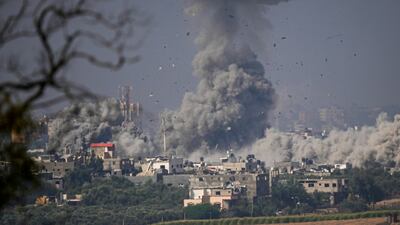When Israeli soldiers entered the Gaza Strip on October 27, their commanders set out two objectives. The first was to rescue the Israeli and foreign hostages kidnapped three weeks earlier by Hamas, the militant group that runs the enclave. The second was the “complete destruction” of that group.
The former goal was received, by and large, with sympathy on the international stage – even countries that back Hamas, like Syria and Iran, were initially muted in their criticism of Israel’s intentions to that end. The deadly operation in Israeli territory by Hamas and Palestinian Islamic Jihad six months ago, on October 7, was carried out in brutal fashion, and most of the people they killed, as well as the 253 hostages they took, were innocent civilians.
The latter goal, however, was met with deep scepticism and fear of what full-scale war might mean, within the region, Palestine and Israel itself. Destroying Hamas seemed impossible – the group was too sprawling and too entrenched in every corner of the Strip. The way it took Israel completely by surprise on October 7 showed what a formidable force it was, and any attempt to dislodge it – let alone destroy it – would result in an intractable war with a grave cost in terms of Palestinian civilian lives.
Six months on, the worst fears have been superseded by the nightmare that is Gaza. Nearly one in 50 Gazans is now dead, and almost all of the rest of the population has been displaced. Nearly all of the enclave’s public infrastructure – hospitals, universities, places of worship, ports, roads and power plants – lies in ruin. And Israel appears nowhere close to achieving either of its two goals.
By all indications – and perhaps all too predictably, given the little regard Israel has shown for Palestinian life throughout its decades-long occupation of the West Bank and East Jerusalem, and its blockade of the Gaza Strip – what Israel claimed to be a war of self-defence has instead degraded into a campaign of undisciplined vengeance.
The targeting this month of seven foreign aid workers, which Israel claims was a case of “misidentification”, brought further attention to the lack of restraint with which Israeli troops have operated. Those deaths gave even the US, which up until now has supported Israel in full force, pause. US President Joe Biden has intimated that if Israel does not do more to protect innocents, Washington may rethink the scale of its support. Sadly, the deaths of more than 200 Palestinian aid workers in recent months elicited no such response.
Israel’s actions in Gaza have also thrust the plight of Palestinians – not only in Gaza, but in the occupied West Bank and Jerusalem, too – back into the global spotlight. Hamas’s methods on October 7 rightly disgusted the world, but few can now deny that the Israeli oppression that led to them, which remains on full display in Palestinian land, is no longer a tenable status quo.
The conflict has also expanded well beyond Gaza. In southern Lebanon, fighters from the militant group Hezbollah are clashing regularly with Israeli soldiers, and villages in the area are routinely bombed by Israeli fighter jets. An unprecedented Israeli air strike on the embassy of Iran, Hezbollah’s main backer, in Damascus last week also sent a shockwave through the region.
On Saturday, tens of thousands of Israelis took part in demonstrations against Mr Netanyahu, demanding he step down and that Israel pursue a deal with Hamas that could see the remaining hostages in Gaza – around 130 – freed. On Sunday, truce talks between mediators – the US, Egypt and Qatar – resumed in Cairo, though Israel and Hamas’s demands, at least on the surface, remain mutually exclusive.
There is little doubt that, half a year since this conflict started, momentum is building. But unless Israeli leaders start seeing beyond the narrow lens of their desire for asymmetric victory and subjugation of Palestinian lives, they will be set against a global momentum that even the United States cannot shield them from.


